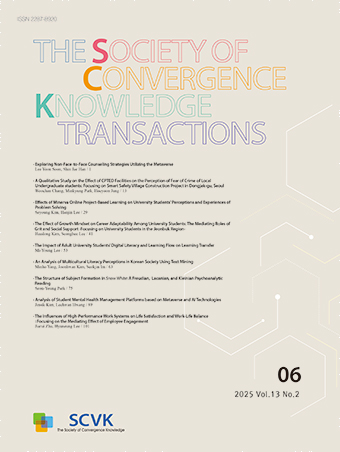Research Article
Abstract
References
Information
본 연구는 목회자의 긍정심리자본과 감정노동이 정서적 소진 및 라포르에 어떤 영향을 미치는지 검증하는데 목적이 있다. 이를 위해, 목회자 188명을 대상으로부터 수집한 자료를 바탕으로 구조방정식모형(SEM)을 통해 실증적으로 분석한 결과는 다음과 같다. 첫째, 목회자의 긍정심리자본은 심층연기 및 표면연기에 유의한 정적 영향을 미치는 것으로 나타났다. 둘째, 심층연기는 정서적 소진에 유의한 영향을 미치지 않는 것으로 나타났으며, 표면연기는 정서적 소진에 유의한 정(+)의 영향을 미쳤다. 셋째, 심층연기와 표면연기도 라포르에 유의한 정적 영향을 미치는 것으로 나타났다. 넷째, 심층연기와 표면연기는 긍정심리자본과 정서적 소진 및 라포르 간의 관계를 유의하게 매개했으나, 심층연기는 긍정심리자본과 정서적 소진에 유의하게 매개되지 않았다. 끝으로 본 연구는 목회자의 감정노동을 관리하고 긍정심리자본과 라포르를 촉진하는 방안이 필요하다는 것을 시사한다.
The purpose of this study is to verify how a pastor's positive psychological capital and emotional labor influence emotional exhaustion and rapport. Based on data collected from 188 pastors, the results analyzed empirically through Structural Equation Modeling (SEM) are as follows. Firstly, it was found that a pastor's positive psychological capital has a significant positive impact on both deep acting and surface acting. Secondly, deep acting was not found to have a significant negative impact on emotional exhaustion, while surface acting was found to have a positive impact on emotional exhaustion. Thirdly, both deep acting and surface acting had significant positive effects on rapport. Fourthly, while both deep acting and surface acting mediated the relationship between positive psychological capital and emotional exhaustion as well as rapport, deep acting did not significantly mediate the relationship between positive psychological capital and emotional exhaustion. In conclusion, this study suggests the need to manage pastors' emotional labor and promote positive psychological capital and rapport.
- https://www.trendmonitor.co.kr/tmweb/trend/allTrend/detail.do?bIdx=2460&code=0401&trendType=CKOREA
- https://www.christiantoday.co.kr/news/356017
- 김준수, "목회자의 스트레스와 탈진", 복음과 상담, 제8권, pp. 33-58, 2007.10.17841/jocag.2007.8..33
- 장은진, "목회자 사모의 정신건강과 상담에 대한 요구도 연구", 한국기독교상담학회지, 제16권, pp. 187-210, 2008.
- 유명복, "이중직 목회자가 겪는 심리적 갈등", 기독교교육정보, 제67권, pp. 99-122, 2020.
- J. B., Avey, F., Luthans, and S. M., Jensen, "Psychological capital: A positive resource for combating employee stress and turnover", Human Resource Management, Vol. 48, pp. 677-693, 2009.10.1002/hrm.20294
- E. M. D., Vasconcelos, M. M. F. D., Martino, and S. P. D. S., França, "Burnout and depressive symptoms in intensive care nurses: relationship analysis", Revista Brasileira de Enfermagem, Vol. 71, pp. 135-141, 2018. 10.1590/0034-7167-2016-0019 29324955
- S. R., Dhaini, K., Denhaerynck, S., Bachnick, R., Schwendimann, M., Schubert, S., De Geest, and Match RN study group, "Work schedule flexibility is associated with emotional exhaustion among registered nurses in Swiss hospitals: A cross-sectional study", International Journal of Nursing Studies, Vol. 82, pp. 99-105, 2018. 10.1016/j.ijnurstu.2018.03.019 29626703
- A. P., Lian Chng, "The impact of burnout and spiritual well-being on the job satisfaction of pastors within the Methodist Church in Singapore", Unpublished dissertation, Asbury Theological Seminary, 2011.
- 김영경, "목회자 아내들을 위한 집단상담 프로그램 개발", 한국기독교상담학회지, 제12권, pp. 92-116, 2006.
- 조윤득, 신현석, 박은앙, "돌봄 서비스 영역에서 감정노동이 사회복지사의 소진과 심리사회적 건강에 미치는 영향: 부산ㆍ경남 지역의 시설들을 중심으로", 사회과학연구, 제26권 1호, pp. 121-142, 2010.
- C. M., Brotheridge, and A. A., Grandey, "Emotional labor and burnout: comparing two perspectives of "people work"", Journal of Vocational Behavior, Vol. 60, pp. 17-39, 2002. 10.1006/jvbe.2001.1815
- J. B., Avey, F., Luthans, and C. M., Youssef, "The additive value of positive psychological capital in predicting work attitudes and behaviors", Journal of Management, Vol. 36, pp. 430-452, 2010. 10.1177/0149206308329961
- F., Luthans, S. M., Norman, B. J., Avolio, and J. B., Avey, "The mediating role of psychological capital in the supportive organizational climate - employee performance relationship", Journal of Organizational Behavior, Vol. 29, No. 2, pp. 219-238, 2008. 10.1002/job.507
- F., Luthans, "Positive organizational behavior: Developing and managing psychological strengths", Academy of Management Executive, Vol. 16, pp. 57-72, 2002. 10.5465/ame.2002.6640181
- A., Hochschild, "The managed heart: Commercialization of human feeling", Berkeley, CA: University of California Press, 1983.
- A. A., Grandey, "When "the show must go on": Surface acting and deep acting as determinants of emotional exhaustion and peer- rated service delivery", Academy of Management Journal, Vol. 46, No. 1, pp. 86-96, 2003. 10.5465/30040678
- A. R., Hochschild, "Emotion work, feeling rules, and social structure", American Journal of Sociology, Vol. 85, No. 3, pp. 551-575, 1979. 10.1086/227049
- P. K., Adelmann, " Emotional labor as a potential source of job stress", In S. L. Sauter & L. R. Murphy (eds.), Organizational Risk Factors for Stress (pp.371-381). Washington, DC: American Psychological Association, 1995.10.1037/10173-023
- R. J., Steinberg, and D. M., Figart, "Emotional labor since: The managed heart", The Annals of the American Academy of Political and Social Science, Vol. 561, No. 1, pp. 8-26, 1999. 10.1177/0002716299561001001
- A. K., Smith, and R. N., Bolton, "The effect of customers' emotional responses to service failures on their recovery effort evaluations and satisfaction judgments", Journal of the Academy of Marketing Science, Vol. 30, No. 1, pp. 5-23, 2002.10.1177/03079450094298
- R. I., Sutton, "Maintaining norms about expressed emotions: The case of bill collectors", Administrative Science Quarterly, Vol. 36, No. 2, pp. 245-268, 1991.10.2307/2393355
- 지성구, 김성호, 양범선, "의료서비스 제공자의 라포르가 감정노동, 직무만족, 조직몰입에 미치는 영향", 서비스경영학회지, 제11권 제1호, pp. 209-236, 2010.
- 곽묘묘, 김미옥, 노미오, 황호영, "중국 감정노동자의 감정노동 선행요인과 결과요인에 관한 연구: 라포르와 감정노동의 비선형 관계 검증", 경영교육연구, 제31권 제3호, pp. 219-241, 2016.
- J. F., Hair, W. C., Black B. J., Babin, and R. E., Anderson, "Multivariate data analysis: A global perspective (7th ed.)", Upper Saddle River, NJ: Pearson Education, 2010.
- F., Luthans, C. M., Youssef, and B. J., Avolio, "Psychological capital: Developing the human competitive edge", 2006.10.1093/acprof:oso/9780195187526.001.000116435945
- C. M., Brotheridge, and R. T., Lee, "Testing a conservation of resources model of the dynamics of emotional labor", Journal of Occupational Health Psychology, Vol. 7, pp. 57-67, 2002.10.1037/1076-8998.7.1.5711827234
- J. R., Halbesleben, and E., Demerouti, "The construct validity of an alternative measure of burnout: Investigating the english translation of the oldenburg burnout inventory", Work & Stress, Vol. 19, No. 3, pp. 208-220, 2005.10.1080/02678370500340728
- D. D., Gremler, and K. P., Gwinner, "Rapport-building behaviors used by retail employees", Journal of Retailing, Vol. 84, No. 3, pp. 308-324, 2008.10.1016/j.jretai.2008.07.001
- J, Nunnally, "Psychometric Theory (2nd ed.)", New York, NY: McGraw-Hill, 1978.
- L. T., Hu, and P. M., Bentler, "Cutoff Criteria for Fit Indexes in Covariance Structure Analysis: Conventional Criteria versus New Alternatives", Structural Equation Modeling: A Multidiscipinary Journal, Vol. 6, No. 1, pp. 1-55, 1999.10.1080/10705519909540118
- A. F., Hayes, "Partial, conditional, and moderated moderated mediation: Quantification, inference, and interpretation", Communication Monographs, Vol. 85, No. 1, pp. 4-40, 2018.10.1080/03637751.2017.1352100
- J. B., Avey, F., Luthans, R. M., Smith, and N. F., Palmer, "Impact of positive psychological capital on employee well-being over time", Journal of Occupational Health Psychology, Vol. 15, pp. 17-28, 2010.10.1037/a001699820063956
- Publisher :The Society of Convergence Knowledge
- Publisher(Ko) :융복합지식학회
- Journal Title :The Society of Convergence Knowledge Transactions
- Journal Title(Ko) :융복합지식학회논문지
- Volume : 12
- No :1
- Pages :55-63
- DOI :https://doi.org/10.22716/sckt.2024.12.1.006




 The Society of Convergence Knowledge Transactions
The Society of Convergence Knowledge Transactions







